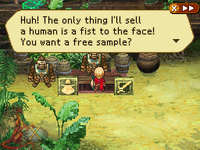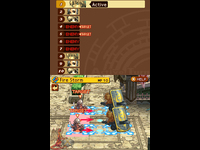|
|

|
PLATFORM
|
DS
|
BATTLE SYSTEM
|

|
INTERACTION
|

|
ORIGINALITY
|

|
STORY
|

|
MUSIC & SOUND
|

|
VISUALS
|

|
CHALLENGE
|
Moderate
|
COMPLETION TIME
|
20-40 Hours
|
|
OVERALL

|
+ Fast-paced, entertaining combat system
+ Well-told, well-paced plot
+ Plenty of reasons to explore
- Paradoxical leveling
- More linear than it initially appears
+ Can skip the plot sequences when revisiting sequences
|
Click here for scoring definitions
|
|
|
Radiant Historia is not alone in its use of time travel as a plot device, but the game goes about its temporal movement in a good way. That would mean little if the rest of the game was unappealing, making it fortunate that Radiant Historia demonstrates several interesting gameplay aspects along with its central time travel tenet. Atlus's decision to localize this title is a good one, since its lack of recognition among the brand name-minded is offset by being a high-quality product.
Stocke is a taciturn operative in the Special Intelligence branch of the military, and he has been tasked with escorting an agent safely away from the dangerous battle zones. This mission fails miserably, but Stocke is saved from death by a tome he was handed before the operation began. This White Chronicle grants him alone the ability to travel through time, with the supreme goal being a solution to the encroaching desertification from which the entire continent is suffering. Two paths open for Stocke, one in which he remains a Special Intelligence operative, and another in which he joins the ranks of the regular army. Standard plot elements for RPGs are found along both, but told in an interesting manner and with many quite effective scenes along the way.
Jumping between the two histories can be done at any save point, whereupon Stocke will be able to choose between a number of nodes representing significant scenarios. Often the player will be forced to choose from two courses of action, one of which is correct, while the other will result in a scene detailing exactly how that choice was wrong and ended the story, similar to the Choose Your Own Adventure books. Fortunately, though obtaining these scenarios does result in being booted back to an earlier point, hitting the Start button will skip through cutscenes to minimize the time spent backtracking for any reason.
 Did you say FREE? Oh boy! ... Thanks, now I need to visit the dentist.
Did you say FREE? Oh boy! ... Thanks, now I need to visit the dentist.
|
|
Running through the numerous environments will attract the attention of enemies, which can usually be smacked with Stocke's sword to get them out of the way in order to avoid combat. Beating the enemy yields experience and money, which carries over regardless of the current temporal location to every member of the party. While this makes sense from a gameplay perspective, in the name of keeping every character useful, it still is paradoxical considering Stocke is supposed to be the only one aware of the time traveling. Combat is superficially similar to several other turn-based systems in which the enemy occupies a grid that determines offense and defense, but there are unique variable in Radiant Historia that make its combat quite entertaining.
One unique factor is the ability for characters to switch turns with each other, or with an enemy. Switching turns, particularly with an enemy, might sound completely unnecessary, but it dovetails nicely with being able to shift enemies' positions, the other major aspect of battling. Certain skills will move enemies to a new position, and until the next foe has a turn, they will stay in a pile that is collectively hurt by moves that would usually only affect one opponent. When coupled with the fact that enemies' defenses dip during long combinations of attacks, battles become a very pleasant race to slam the opposition into a pile for slaughter. To sweeten the deal, everything moves very quickly once the decisions have been made, and there is never any confusion about the turn order.
In combat there are a few tricky fights, but nothing that will confound RPG veterans. Especially if the intricacies of the battle system are understood, and the handy shortcuts supplied during the game are used intelligently, fighting should not be overly trying. Unraveling the correct path to proceed can be more difficult at times, but the game is liberal in providing clues for overcoming the current challenge, so discovering the solution does not require blindly wandering through all available time nodes.
 Smack those guys to and fro, wherever you want them to go.
Smack those guys to and fro, wherever you want them to go.
|
|
Side missions are fairly plentiful in Radiant Historia, and a few of them affect the ending directly. Some side quests also unlock new moves for the characters, giving a great incentive to chat with the NPCs occupying space. Even the most direct route through the game will require close to forty hours, bucking the frequent trend of DS games being rather short.
The visuals do not push the capabilities of the DS in any way, but are not glaringly deficient either. Yoko Shimomura's score, on the other hand, is a fine piece of work. A few of the tracks are lesser, but her compositional skill has crafted a number of superb themes to denote the game's locales. Even the lesser tracks are hardly a cacophony that the ears will rebel against, but they are few in number, and most of the music is extremely captivating and worthy of hearing outside the game.
Radiant Historia does have a few annoyances, such as the occasional long stretch without a temporal node that can be accessed, but they are minor. Fighting the enemy remains invigorating throughout, and the twisting tales that propel the plot continue to be interesting. When even hunting for the solution to an idiot NPC's propensity to stay in an area that will soon be a battlefield is tantalizing enough to warrant going back in time, the game has clearly done a lot right.
Review Archives
|









